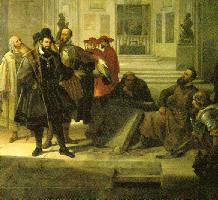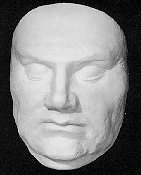Luther's Role in Religious Discussions and
his Relationship to Reformers in Other Movements.
Luther's moderate approach, his attitude towards the insurgent peasants and his compromises with sovereigns caused him to be accused by all sides. On the other hand, Luther was constantly under pressure to defend the Reformation politically and theologically against the Roman Catholic faction. Many of his ex-supporters did not want to help bear the burden of this thin line Luther was walking.
 Already in 1524-26 Luther had fought with the Dutch humanist Erasmus von Rotterdamm which caused lots of stress to the reformation and ended in a split among humanists who had previously welcomed Luther's reforms.
Already in 1524-26 Luther had fought with the Dutch humanist Erasmus von Rotterdamm which caused lots of stress to the reformation and ended in a split among humanists who had previously welcomed Luther's reforms.
The difference of opinion between Luther and Karlstadt or between Luther and the Swiss reformer Zwingli about the role of communion in the worship service led to the Marburg Religious Discussions of 1529, where only one partial agreement was reached.
Luther and Melanchthon were critically opposed to the Baptist movement; however, when the Baptist's empire in Münster was overthrown in 1534-1535, the two condemned the treatment of the Baptist.
In 1537, a clash ensued between Luther and Johann Agricola, one of Luther's supporters in Wittenberg who ended up leaving Wittenberg in 1540.
Luther's Last Years of Life (1540-46)
"I am weak, I cannot go on"During his last years of life Luther fought against many physical ailments. The death of his daughter Magdelena, in 1542, was also very difficult for him.
Luther's relationship to people with different beliefs, especially the Jews, deteriorated drastically during these years. His 1523 work Jesus was born a Jew showed a concilliatory attitude; however, in later years the aging reformer sentenced all who did not want to convert to his beliefs. The strongly anti-semetic work Jews and their Lies(1543) came out during this period.
Luther continued to lead the Reformation in its fight against its enemies even in the last years of his life. With his 1545 work Against the Papacy at Rome Founded by the Devil! he performed his last blow against the Roman Church.
Luther continued his preaching duties despite his various disappointments and ailments.
Luther continued to teach at Wittenberg University until the end of his life; his last lecture ended with the words: "I am weak, I cannot go on."

Luther's Death (1546)
Luther set off on his last trip on January 17, 1546, to his birthplace Eisleben (only in German). Although he was drawn with illness, he went to settle a dispute among the Mansfeld Counts. The negotiations endedsuccessfully.
Luther did not have the energy to return to Wittenberg. He died on February 18, 1546 in Eisleben. On his death bed, he prayed "Into your hands, I command my spirit. You have saved me, Father, you faithful God."
After the coffin was displayed for two days in Eisleben, Luther's body was transported through Halle and Bitterfeld back to Wittenberg.
On February 22 Luther was laid to rest in the Castle Church in Wittenberg; Johannes Bugenhagen held the funeral oration.
The house in which Luther died (German only)
Further Information: Dr. Volkmar Joestel (in honor of the Luther Year, 1996), Lutherhalle Wittenberg: Luther's Death